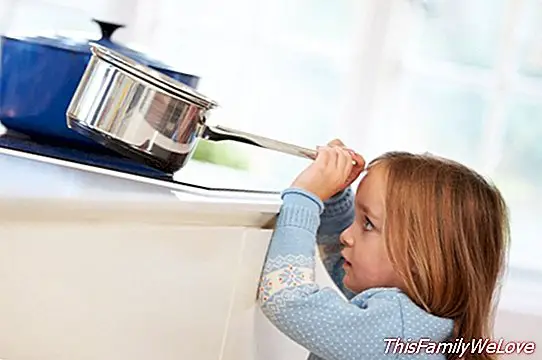Scalds, how to treat these injuries

Caring for children sometimes requires more eyes and ears that parents do not have. It is not uncommon that at some point the desire to investigate and the curiosity of the smallest end up causing some injury or injury in them. There are many possibilities that can lead to this result: the knob of a door, the tip of a piece of furniture and even liquids that are heating up.
These last accidents often cause scalds in children, injuries that must be treated immediately and effectively to prevent them from going over these problems. Acting quickly and getting to know these wounds helps this incident with hot liquids be scared.
What are the scalds
Pediatricians define scalds as injuries caused by the contact of liquids or hot water with the skin or mucous membranes. This type of burns are the most frequent in childhood, especially in children under 2 years. The parts that are most affected are the hands, arms and neck.
These injuries require rapid attention from parents because the skin of children it supports the heat worse that the dermis of adults. Sometimes minors can suffer burns at temperatures that in the elderly do not pose any danger. For example, the exposure of children to liquids at 60º C is capable of causing third degree burns.
How to proceed at this time
Once these accidents occur because they know what should be done and what is not recommended in these cases. Pediatricians recommend that parents act as follows in these situations:
- Must cool the burn quickly and apply fresh water for 10 or 20 minutes. Never use ice for this purpose.
- Remove clothes around of the burned area as long as it is not attached to the skin.
- Determine if the burn is small and shallow, in this case there is only red skin, and apply a moisturizer. We will have to monitor if changes occur. It is also recommended to treat pain by administering paracetamol or ibuprofen.
- In the event that the burn expels liquid, it must be covered with a sterile gauze. If you do not have it, you can use a clean sheet or towel, without tightening it so that it does not stick to your skin, and consult your pediatrician.
In the same way, pediatricians advise never to do any of these actions:
- Do not apply ice, butter, toothpaste, or other home remedies on the burn.
- Do not break the blisters, nor remove the dead skin.
- Do not take off the clothes on the skin.
- Do not turn on the light switch if it smells of gas.
Prevent scalds
The best medicine is always prevention, to prevent these accidents from happening. Monitor different elements in the home and making it difficult for children will make a climate of security prevail at home. These are some tips:
- Should be prevented, as far as possible, that children enter the kitchen. If it is not feasible, they must be supervised at all times.
- Place the pans and pans on the fire so that the handle does not protrude from the kitchen cabinet.
- The kitchen furniture must be fixed so that it does not tilt, causing liquids or hot foods to fall on the child.
- Do not leave chairs nearby so that the child can not climb.
Damián Montero




